They applied the cool gel to my scalp and then pressed an electrode to it. Only five more to go on my head and four more on my face and jaw for this sleep study, I thought.
I tried not to squirm. I was about to sleep overnight in the basement of my school’s psychology building. It was rumored to be creepy, not due to any ghost stories but because it was said to be designed like a maze in homage to Edward C. Tolman who was famous for his rat maze experiments12.
People, even the graduate students who worked there, got lost in that basement all the time. But I was there to rest, to help out with a burgeoning sleep study. I volunteered to be hooked up and my brain monitored as I slept. Sounds comfortable, right?
Sleep has, over the recent years, become a topic of importance. Although the idea of people who stay up late to work on ideas has been made attractive in modern society, we have learned, through various studies, how detrimental lack of sleep over time can be.
Right now, the pandemic may be impacting your sleep for better or for worse. You may be able to rest more because you don’t have your commute to work or you may be sleeping less because you’re worried about what’s happening13.
For me, I don’t even need a pandemic to jolt me awake in the middle of the night worrying about my life’s progress and feeling guilty for what I didn’t accomplish during the day.
(Related: Feel Like You’re Always Running Out of Time?)
Celebrating sleep

This post is dedicated to the upcoming National Napping Day on March 15th and World Sleep Day on March 19th14. (Do we celebrate by sleeping?) I think we all could use some good pointers on sleep considering how important it is and how much it can contribute to a more enjoyable and happy life.
We’re taking sleep seriously in this post – read on to learn more.
Why does sleep matter?
In 1963, a teenager named Randy Gardner decided to do an experiment for his school’s science fair where he would stay awake non-stop for 11 nights11. He had his friends monitor him and, besides drinking soda, he managed to fight his sleepiness on his own and break a record in the process.
And what happened to him? Well, just three days in, he began to feel nauseous and have memory issues11. Then, his senses like taste, smell, and hearing as well as his cognitive abilities began to be affected15. He made it through the 11 days but afterward was taken to a naval hospital to have his brain waves monitored11, similar to how my brain was monitored, and it took him some days for his brain to show normal waves again15.
In 2017, NPR did an interview with him about how his stunt affected him later in life. Randy said since about 2007, he has stopped sleeping and struggles with being irritable and difficult for others to be around11. Although he has learned to cope with his insomnia, he reveres rest and calls it “one of the big three: water, food sleep11.
Not sleeping is so dangerous that, although Randy broke a record, The Guinness Book of World Records has gotten rid of that category11.
What lack of rest hurts
Not sleeping affects not only your mental health but also your physical health. If you don’t get a good night of rest here and there, it’s nothing to stress about. But don’t think of sleep as something you can make up for later and it’s not something you can build up credit for11. It’s not like calories you can save as fat in your body to burn later when you don’t have enough food.
If there’s something that is contributing to an ongoing sleep issue for you, then it needs to be addressed.
Eventually, chronic poor sleep will affect you by putting your health at risk. It can increase your chances of developing obesity, heart disease, and type 2 diabetes3. You’re more likely to gain weight because you’re tired which can cause you to eat more and, at the same time, your metabolism isn’t as good so you don’t burn off the calories you consume as efficiently.
When you are sleep deprived, you produce more cortisol, which is a stress hormone. This hormone causes you not to feel as good overall and you may be more reactive. So, when you consider pulling an all-nighter when you’re stressed about a class or a job, just know that you’re only going to make the situation worse for yourself.
Obviously, you can’t go back in time, but in the future, it’s better not to put yourself in this situation in the first place.
Are you pro-sleep yet?
According to the CDC, adults 18-60 years old should get 7 or more hours of sleep4.
Getting consistent, good quality sleep can lead to better cognition, less confusion, and better coordination, judgment, and memory3. So, if you’re still weighing the benefits of sleeping better and getting more done, I hope you’re quickly coming to the conclusion that getting rest is worth it.
Let’s not forget that decreased attractiveness and expedited aging7 are tied to lack of sleep as well. So, maybe it takes time and we can’t “see” the internal damage, but it turns out that lack of sleep also affects us superficially. And sure, there are filters on Instagram and Snapchat but the real-life-you matters.
Getting your rest will fix those dark under-eye circles, will make your skin less inflamed, and give you a healthy glow. And sleep is free! Take advantage of it.
How to get better sleep
Our bodies are on a natural rhythm that is in-sync with the world. This rhythm is called the Circadian Rhythm. It’s a 24-hour cycle8 where we naturally feel more energetic at times and sleepy at times. This typically corresponds with the day. You naturally rise in the morning, get sleepier throughout the day and go to sleep at night.
As we stay awake, a neurotransmitter called adenosine builds up in our brain that makes us sleepy. It’s like a natural countdown timer. This is what coffee blocks so we don’t feel tired.
The other important chemical in our brain that relates to sleep is melatonin, which we all naturally make. As we see dark, it triggers our pineal gland in our brain to start excreting melatonin, which makes us sleepy. This is why artificial bright lights can mess up our cycle.
Yes, your phone, computer, television screens can mess up your sleep schedule. Looking at my phone before bed has become one of my bad habits. I think it has become a lot of people’s bad habit actually.
Here are some tips you can use:
Have a consistent sleep schedule
I’m also bad at this and am currently trying to shift my sleep schedule earlier. Basically, if you want to plan for a full 8 hours of sleep, calculate the time you will need to wake up in the morning and calculate back for your bedtime.
Try to keep this same bedtime even on weekends. If you have an irregular sleep schedule, even if you are in bed for 8 hours every night, your quality of sleep won’t be as good, which will negatively affect you over time5.
With a regular sleep schedule, you’ll be able to “break up with your alarm clock”. Your body will naturally wake up at the end of its 7-9 hours of slumber and it’s so much better to finish your sleep cycle naturally than be interrupted by a blaring alarm clock.
If you don’t trust that you’ll wake up, you can always set your alarm for a little later to catch yourself.
Exercise everyday
Do you lie down to sleep and then get a sudden surge of energy? It may be that you don’t use up enough of your energy during the day.
Exercising and breaking a sweat during the day will help you sleep better at night5.
Have a cool, dark room

As we discussed earlier, your body responds to the dark and makes you sleepy so if your room is filled with bright lights like your phone or tv at the end of the bed, you’re not going to get as good of sleep5.
Try to have natural lighting in your room or dim the lights if you can. If you feel up to it, use candles but just remember to put them out before you fall asleep!
The rule of thumb is to turn off electronics about an hour before bed. I also use the night shift mode on my computer and phone and set it earlier in the evening so it starts before my bedtime routine.
Drink some chamomile tea
I used to take melatonin pills during a period of time when I was stressed and having trouble sleeping but since long-term effects are limited16, I’ve started to drink chamomile tea on some evenings because it’s more natural.
Chamomile tea helps you fall asleep and feel sleepy if you’re having trouble getting to sleep6.
I usually try not to drink it too close to bedtime and I make it more concentrated so I’m drinking less fluid otherwise I disrupt my sleep because I have to get up and use the bathroom in the middle of the night.
Address your bad habits
Are you drinking caffeine too late in the day? Since you don’t want to disrupt your Circadian rhythm, it’s not recommended to drink caffeine about six hours before bed. So, again, knowing your bedtime, calculate when you should stop. Usually, it’s best not to drink caffeine after 3 pm.
Are you eating dinner or food too late? You should try not to eat about 3-4 hours before your bedtime. Spicy foods, especially, should not be eaten close to bedtime.
Are you drinking alcohol to make yourself sleepy? Alcohol, even though it might make you feel sleepy, actually disrupts your quality of sleep.
Are you doing other activities in or on your bed? Try to only associate sleep and activities that belong in bed with your bed. Study, work, play somewhere else if you can.
Relax before bed
Give yourself time to wind-down everyday. Plan about an hour before your bedtime to relax. You could meditate, stretch, journal, reflect, or read.
Don’t do something new. I sometimes try to start something new or something I didn’t get to during the day before I go to bed hoping that it will make me feel better or less guilty about not getting something done. I think that I’ll be able to sleep sounder but it backfires because I just end up winding myself up and delaying my bedtime. I’ve learned it’s better to just go to bed and wake up all the earlier the next day, refreshed and energetic.
As you’re lying in bed, if you can’t get your mind to “shut down”, try listing random things. I usually start with the first thing that pops in my head and continue from there. It’s not really an active activity; I passively let loosely associated things go through my head.
This was also recently listed on Tik Tok and people have said it works so give it a try and let me know if it works for you1!
Consider other ongoing issues
You may have an issue that is outside of your voluntary decisions that are affecting your slumber like sleep apnea, restless leg syndrome, night terrors, or sleepwalking to name a few3. You may also be taking a medication that interferes with your sleep10.
If this is going on, see a medical professional. They can refer you to a sleep clinic so you can learn more about it and figure out the best treatment method.
Depression or stress can also affect your rest and this will be more complex and may take time to address. Dealing with stressors like finances, discrimination, and relationship issues can haunt you in the middle of the night. Again, there are professionals out there that can help. You may also have to face that it is a phase you’ll have to push through.
No storm can last forever. It will never rain 365 days consecutively. Keep in mind that trouble comes to pass, not to say. Don’t worry! No storm, not even the one in your life, can last forever.
Iyanla Vanzant
Counting sheep to good sleep

Daylight savings time was this Sunday along with Pi Day (I’m pointing out so many national and world days in this post). If, after reading this rather long post about sleep, you still don’t see the importance of it, consider this.
“Even just the smallest amount of insufficient sleep, we see health consequences. And I think perhaps, you know, one of the best examples of that small perturbation is one of the largest sleep experiments ever done. It’s been performed on 1.6 billion people. It happens twice a year, and it continues to happen. It’s called daylight saving time. And in the spring when we lose an hour of sleep, we see a subsequent 24 percent increase in heart attacks. In the fall when we gain an hour of sleep opportunity, there is a 21 percent decrease in heart attacks.” – Matthew Walker11
Let’s be kind to ourselves and really give ourselves the best chance at a wonderful life by getting the good sleep we deserve. The well-rested you is a happy you. Not ewe. You!
Live happier,
Nicole
Other posts to read:
- Why Slowing Down and Doing Less Can Bring You More in Life
- How to Be Happier About Your Money
- Motivation: Use it to Succeed in Your Endeavors and be Happier
Share this post:
Sign up for my newsletter and never miss a new post (bi-weekly)!
Follow me on social media!
If you enjoyed reading this, consider “buying me a coffee”. Every little bit helps keep this blog running ad-free!
References
- Mayo, Keenan, This Easy Trick for “Falling Asleep in 5 Minutes Is Going Viral. MSN: Lifestyle. 2020 Mar. Retrieved from https://www.msn.com/en-us/health/wellness/this-easy-trick-for-falling-asleep-in-5-minutes-is-going-viral/ar-BB1euco1
- Theobald, Mikel. What Happens to You When You Don’t Sleep for Days. Everyday Health. 2018 Jan 31. Retrieved from https://www.everydayhealth.com/conditions/what-happens-when-you-dont-sleep-days/.
- Sleep and Sleep Disorders: How Much Sleep Do I Need? CDC. 2017 Mar 02. Retrieved from https://www.cdc.gov/sleep/about_sleep/how_much_sleep.html.
- Sleep and Sleep Disorders: Tips for Better Sleep. CDC. 2016 Jul 15. Retrieved from https://www.cdc.gov/sleep/about_sleep/sleep_hygiene.html.
- Healthy Sleep Habits. Sleep Education. 2017 Feb 09. Retrieved from http://sleepeducation.org/essentials-in-sleep/healthy-sleep-habits.
- Sundelin, Tina, Lekander, Mats, Sorjonen, Kimmo, and Axelsson John. 2017 Negative effects of restricted sleep on facial appearance and social appeal. R. Soc. Open sci. 4: 160918. http://dx.doi.org/10.1098/rsos.160918.
- Harper, Kristin. The Science of Sleep. ACS. 2017 Jan. Retrieved from https://www.acs.org/content/acs/en/education/resources/highschool/chemmatters/past-issues/archive-2014-2015/the-science-of-sleep.html.
- Wegrzyn, Kristen. How stress affects the way Americans sleep. 2021 Mar 09. Retrieved from https://oanow.com/news/science/how-stress-affects-the-way-americans-sleep/collection_656d05fc-ff82-5e5f-b858-404eba625985.html#8.
- 8 reasons why you’re not sleeping. Harvard Women’s Health Watch. 2014 Feb. Retrieved from https://www.health.harvard.edu/sleep/8-reasons-why-youre-not-sleeping.
- Vedantam, Shankar. The Haunting Effects of Going Days Without Sleep. NPR. 2017 Dec 27. Retrieved from https://www.npr.org/2017/12/27/573739653/the-haunting-effects-of-going-days-without-sleep.
- Lombrozo, Tania. Of Rats and Men: Edward C. Tolman. NPR. 2013 Feb 11. Retrieved from https://www.npr.org/sections/13.7/2013/02/11/171578224/of-rats-and-men-edward-c-tolman.
- Simonpillai, Radheyan. How the pandemic made sleeping even more complicated in Toronto. NOW Magazine. 2021 Mar 11. Retrieved from https://nowtoronto.com/lifestyle/health/how-the-covid-19-pandemic-complicated-sleep-and-insomnia.
- Dr. DelRosso, Lourdes. Regular Sleep for a Healthy Future. World Sleep Day. 2021. Retrieved from https://worldsleepday.org/.
- Keating, Sarah. The boy who stayed awake for 11 days. BBC. 2018 Jan 18. Retrieved from https://www.bbc.com/future/article/20180118-the-boy-who-stayed-awake-for-11-days.
- Seladi-Schulman Ph.D., Jill. Is It Safe to Take Melatonin Every Night? Healthline. 2020 Nov 06. Retrieved from https://www.healthline.com/health/is-it-bad-to-take-melatonin-every-night#bottom-line/.
- Van De Walle, MS, RD., Gavin. When Is the Best Time to Drink Coffee? Healthline. 2020 May 15. Retrieved from https://www.healthline.com/nutrition/best-time-to-drink-coffee#anxiety-sleep.

10 replies on “Getting Your Sleep Matters: Sleep Better, Live Happier”
[…] and wake up feeling refreshed and even how to “break-up” with your alarm clock in my related Getting Your Sleep Matters: Sleep Better, Live Happier […]
Nicole, this is such an amazing article on sleep! I agree 100% with you on each point that you made. It is critical for our health, in every sense, to get the right amount of sleep, and the right quality of sleep. Even slight deficits cause big problems! I had no idea that there were days dedicated to celebrating sleep though – how neat! You taught me quite a few things today! 🙂
I also didn’t know that coffee worked by blocking the effects of adenosine in our bodies! That’s a really interesting fact. We always hear conflicting studies about whether or not coffee is healthy for us. I was never a caffeine consumer until I took a job that required me to be up at 3AM every morning to get ready. (sigh) It was awful and there was no way I could power through without that boost! I suppose coffee probably is healthy for us, but only if we’re not using it to get less sleep.
Your tips to improve sleep quality are spot-on too. Getting plenty of exercise has made a world of difference for me; partly because it also alleviates anxiety naturally! Those two often work hand in hand I think – what about you?
Chamomile tea is excellent, I agree! Just recently I purchased some of that and some Lemon Balm tea for relaxation. The soothing effects are amazing! You also mentioned how you used to take melatonin each night to help you sleep. Unfortunately, I’m in the same boat and have been taking melatonin every night for years. 😐 My natural rhythm is to be a night owl and I’ve tried every way I can think of to reset it to no avail. When I just work with my natural rhythm, my life is more complicated because most people operate during the day-time. It can be frustrating!
Thanks again for sharing such a wealth of quality information. You’re going to help a lot of folks. Blessings to you & your loved ones! ♥ Keep up the amazing work you do here at Happier Mindset!
Thank you for reading my post, Holly, and for the kind words! I’m glad you find my article helpful. I’m such an advocate for sleep but struggle with it myself (it’s nice to find a kindred night owl). I’m glad to hear you are trying Lemon Balm tea for relaxation. If you need something stronger than chamomile tea, you can always try Valerian root. It comes in a tea form and is still natural with no drowsy side-effects. However, I don’t enjoy the taste of it so I mostly stick with Chamomile 🙂
Great post on sleep! Sleep is so important for me as I’m a go go go person. If I am not properly rested, my whole day goes terribly! + I do find that I eat/drink more to get more energy which is a big no no. Thank you for sharing xx
http://www.lynnmumbingmejia.com
Thanks for reading! You’re right sleep is good for a productive person and you won’t need to eat extra food to stay energetic.
This is a helpful post. My sleep is so inconsistent at the moment. I tend to sleep better if my room is clean and tidy. Thank you for sharing.
Thank you for reading! I agree – my room needs to be clean too (somewhat at least) to be able to sleep well. I hope your sleep improves!
I loved the very detailed post. Learned the lot. Didn’t know there was a napping day. Also never heard about the circadian rhythm before. It was good knowledge. And cant believe how someone would even want to enter a world record over not sleeping. 11 days to kill own self sounds nothing but suicidal to me. And the seasonal sunlight hour saving link with heart attack was also the first for me. Thanks for the mind opener. Xx
Isa A. Blogger
https://bit.ly/3wOfSuf
Thank you for reading my post! I’m glad I was able to share some new information. I agree that having a contest not to sleep to win a record is a very bad idea! I know I’m my better self when I’m well-rested. (I’m sure we all are.) – XOXO Nicole
[…] given back to it. Taking care of yourself is not just about making sure the outside looks good. Getting your sleep, exercising, and eating right make you feel better but there are more mind-focused relaxation […]